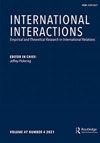Repression and backlash protests: Why leader arrests backfire
IF 1.4
3区 社会学
Q2 INTERNATIONAL RELATIONS
引用次数: 0
Abstract
Abstract This study investigates how different targets of state-sanctioned arrests shape the likelihood of collective action. We hypothesize that leader arrests are especially likely to result in backlash protests. Leader arrests symbolize the suppression of social collectives, they create collective grievances, and constitute focal points for mobilization. Building on a global sample of arrests of cultural identity group members, we qualitatively traced for each arrest whether it sparked a backlash protest. Drawing on coarsened exact matched models, we find that protests are significantly more likely following leader arrests. In contrast, mass arrests are not significantly linked to backlash protests. Additional tests show that organizational membership does not drive this findings, whereas the symbolic value of leaders is linked to protest outbreaks. Our findings cast doubt on the narrow focus on quasi-constant structural variables and make the case for the disaggregation of repression and the importance of triggering events.镇压和反弹抗议:为什么逮捕领导人适得其反
摘要本研究调查了国家批准逮捕的不同目标如何影响集体行动的可能性。我们假设,逮捕领导人特别有可能引发强烈抗议。逮捕领导人象征着对社会集体的镇压,他们制造了集体不满,并成为动员的焦点。基于对文化身份团体成员的全球逮捕样本,我们定性地追踪了每一次逮捕是否引发了强烈抗议。根据粗略的精确匹配模型,我们发现,在领导人被捕后,抗议活动的可能性要高得多。相比之下,大规模逮捕与强烈反对的抗议活动没有显著联系。额外的测试表明,组织成员身份并不能推动这一发现,而领导人的象征价值与抗议爆发有关。我们的发现让人怀疑对准恒定结构变量的狭隘关注,并为镇压的分解和触发事件的重要性提供了理由。
本文章由计算机程序翻译,如有差异,请以英文原文为准。
求助全文
约1分钟内获得全文
求助全文
来源期刊

International Interactions
INTERNATIONAL RELATIONS-
CiteScore
2.40
自引率
7.70%
发文量
38
期刊介绍:
International Interactions is a leading interdisciplinary journal that publishes original empirical, analytic, and theoretical studies of conflict and political economy. The journal has a particular interest in research that focuses upon the broad range of relations and interactions among the actors in the global system. Relevant topics include ethnic and religious conflict, interstate and intrastate conflict, conflict resolution, conflict management, economic development, regional integration, trade relations, institutions, globalization, terrorism, and geopolitical analyses.
 求助内容:
求助内容: 应助结果提醒方式:
应助结果提醒方式:


